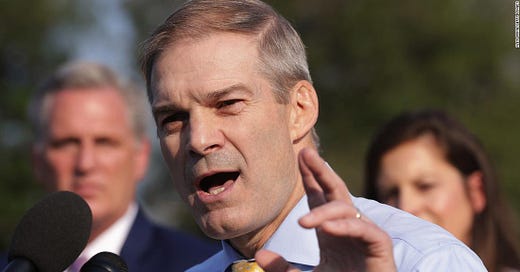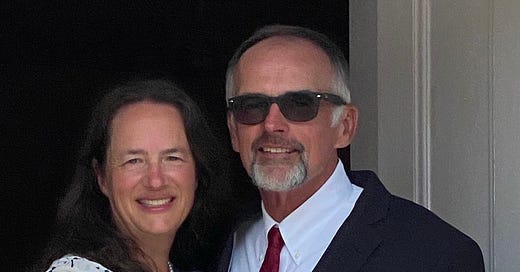
The big news today was the administration’s escalating insistence that our public schools must reopen on schedule for the fall. Today, on “Fox News Sunday,” Secretary of Education Betsy DeVos told Chris Wallace (who is one of the Fox News Channel’s actual reporters), “We know that children contract and have the virus at far lower incidence than any other part of the population, and we know that other countries around the world have reopened their schools and have done so successfully and safely."
Wallace asked her if it was fair to compare countries that have as few as 20 new cases a day with the U.S., which is currently seeing 68,000. DeVos dodged the question.
She vowed to cut off federal funding for public schools that do not reopen. Wallace asked “Under what authority are you and the president going to unilaterally cut off funding, funding that's been approved from Congress and most of the money goes to disadvantaged students or students with disabilities?" “You can’t do that,” he continued.
Then DeVos said something interesting: "Look, American investment in education is a promise to students and their families. If schools aren't going to reopen and not fulfill that promise, they shouldn't get the funds, and give it to the families to decide to go to a school that is going to meet that promise,” she said.
This is the best explanation I've seen for why the administration is so keen on opening up the schools. DeVos is not an educator or trained in education or school administration. She is a billionaire Republican donor and former chair of the Michigan Republican Party. She is a staunch proponent of privatizing the public school system, replacing our public schools with charter schools, as her wealthy family managed to do with great success in Michigan, which has been flooded with low-performing charter schools, which have very little oversight.
It seems she is hoping to use the coronavirus pandemic to privatize education across the nation.
Indeed, the administration has responded to the pandemic by continuing its assault on the activist government Franklin Delano Roosevelt and the Democrats put into place in the 1930s, and on which we have come to rely.
FDR’s New Deal and, after it, Republican President Dwight Eisenhower’s similar Middle Way, used the government to regulate business, provide a basic social safety net, and promote infrastructure, like roads and bridges. But that government has been under siege ever since it was built, by men eager to get rid of government regulation and the taxes necessary to provide a social safety net and infrastructure. In their view, returning the government to the form it took before the 1930s will allow a few wealthy men to dominate society without government interference, thus protecting their liberty and permitting those who know best how to run the country to be in charge.
Since 1981, when President Ronald Reagan took office promising to scale back the federal government, Republican leaders have promised to cut regulation and taxes, and to return power to individuals to arrange their lives as they see fit. But they have never entirely managed to eradicate the New Deal government.
When he took office, Trump set out to do what those before him had not. He has left offices unfilled, slashed regulations and taxes, and did all he could to privatize the functions of the U.S. government.
The administration’s response to the pandemic highlighted the attempt to replace government functions with private efforts. Trump put his son-in-law Jared Kushner in charge of managing the crisis, and Kushner promptly created a task force of young people from venture capital and private equity firms. With no experience in emergency preparation and no contacts in the relevant industries, the volunteers on the task force were ineffectual, simply gumming up the efforts of the career officials whom they were trying to replace.
Notably, when states turned to the federal government to help direct the national response, Trump turned them away, telling them to manage on their own. At the same time, Project Airbridge, the new federal system designed to get critical supplies to the states, used the Federal Emergency Management Agency (FEMA) to fly supplies to the U.S., but then turned them over to private distributors to get them to their customers. This public-private partnership, as the administration called it, frustrated state governors whose incoming supplies were sometimes confiscated for redistribution to places the administration deemed more urgent.
After the first coronavirus bills shored up the economy, Trump began to talk of tax cuts for businesses and investors, arguing—as has been Republican orthodoxy since Reagan—that tax cuts will stimulate the economy (although there is no evidence that this is the case). States and cities and towns are reeling from the loss of tax dollars, but Republicans have been reluctant to support them, apparently hoping to permit them to declare bankruptcy. This has been a long-term plan on the part of Republican leaders, for in a bankruptcy restructuring, the social safety nets of Democratic states like New York could be slashed.
Not helping local governments through this crisis will also cut public school funding.
And finally, with the support and encouragement of the administration, Republicans are downplaying the seriousness of the coronavirus to urge children back to school and their parents back to work. Today, White House officials started trying to discredit Dr. Anthony Fauci, director of the National Institute of Allergy and Infectious Diseases and one of the president’s leading advisors on the pandemic. Fauci has warned that the country is not doing enough to shut down infections, and that things will get worse if we don’t. Unless the economy regains traction, we are facing extraordinary economic dislocation that can only be addressed with the social safety net the Republicans want to get rid of altogether.
In all of this, the administration sounds much like that of President Herbert Hoover who, when faced with the calamity of the Great Depression, largely rejected calls for government aid to starving and displaced families, and instead trusted businessmen to restart the economy. To the extent relief was necessary, he wanted states and towns to cover it. Anything else would destroy American individualism, he insisted.
But by 1932, the same Americans who had supported Hoover in 1928 in a landslide recognized that his ideology had led the nation to catastrophe and then offered no way out. They rallied around Democrat Franklin Delano Roosevelt, who worked together with Congress to create an entirely new form of national government, one that had been unthinkable just four years before.
Last week, presumptive Democratic nominee Joe Biden explicitly echoed the dynamic of the 1932 election, highlighting the economy and economic opportunity. His policy paper reads: “Even before COVID-19, the Trump Administration was pursuing economic policies that rewarded wealth over work and corporations over working families. Too many families were struggling to make ends meet and too many parents were worried about the economic future for their children. And, Black and Latino Americans, Native Americans, immigrants, and women have never been welcomed as full participants in the economy.“
Biden’s economic plan for the country is, according to his campaign, the “largest mobilization of public investments in procurement, infrastructure, and R&D since World War II.” Called “Build Back Better,” the plan calls for investment in infrastructure and R&D to revitalize high-paying American industries and bring critical American supply chains back home. He calls for a revival of trade unions—gutted after 1981—and higher wages, as well as higher taxes on corporations (although not to the levels they were at before Trump’s tax cuts).
The document is a strong one politically, undercutting both Trump’s “America First” language and promising concrete policies for voters suffering in the Republican economy. But it is interesting as well for how clearly it marks a return to a vision of a government that stops privileging an elite few, and instead works to level the economic playing field among all Americans.
—-
Kushner’s task force: https://www.nytimes.com/2020/05/05/us/jared-kushner-fema-coronavirus.html
Airbridge: https://www.cnn.com/2020/04/25/politics/fema-project-airbridge/index.html
Tax cuts: https://www.nytimes.com/2020/05/05/business/economy/trump-tax-cuts-coronavirus-stimulus.html
https://joebiden.com/build-back-better/
https://prospect.org/economy/biden-new-economic-nationalism-better-than-you-may-think/






All of this sounds right, except the "leave governing to us smarter rich elites" part. The motivation seems starker than that. It's clear the current Republican leaders could care less about running the government. What matters is unrestrained control over the nation's private and public assets. Unlike the 1930s, today's elites, their mega-corporations and private equity and criminal networks are not tied to physical locations or nations or colonies. They live in an international world that barely intersects with ordinary mortals (or with the realities of a fragile planet).
In the US, the 1% is systematically sucking the aquifers of US assets dry. Since the 1980s, they have successfully siphoned off worker pay, swallowed most pension obligations, sucked away middle class assets by requiring us to go into debt for education and health and housing, and have been hugely successful in diverting taxes into their private coffers.
In the emerging post-capitalist (?) automated world, corporations no longer need a massive population of expensive American laborers nor an expensive educated population of American managers and technical specialists. They also don't need US consumers as much -- We are saturated with "stuff" while the emerging middle classes of China and India will be buying goods big time for decades to come.
It seems that the underlying motive is to be rid of the burden of the US population and the US government all together. The removal of assets and expertise from our governments and our people is deliberately disenfranchising, impoverishing, and now actively "downsizing" our population. Government structures that Republican support (police, prisons, military, courts, propoganda media, eminent domain) are those that insulate the few winners from the many losers. Despite my cynicism, the US still has enormous resources and human potential and I pray that you are right that a large majority will be looking for a New Deal approach to government and resource stewardship ASAP.
Professor Richardson: Your analysis of the Hoover Administration’s failure to address the economic crisis occurring during their term in office, and Biden’s proposal which, as you say, “…echoed the dynamic of the 1932 election…” was one of the most uplifting things I’ve read in a long time.